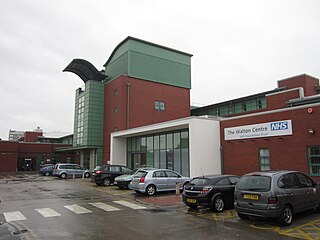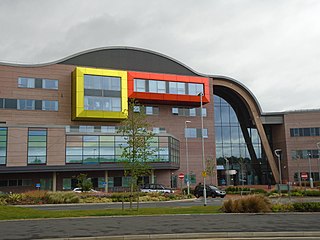Related Research Articles

The Walton Centre, formerly known as the Walton Centre for Neurology and Neurosurgery, is a major neurology hospital located in the suburb of Fazakerley in the city of Liverpool, England. It is one of several specialist hospitals located within the Liverpool City Region alongside Liverpool Heart and Chest Hospital, Alder Hey Children's Hospital, Liverpool Women's Hospital, Mersey Regional Burns and Plastic Surgery Unit and Clatterbridge Cancer Centre. The wards in the hospital are all named after pioneering neurosurgeons in the 20th and 21st century. It is managed by the Walton Centre NHS Foundation Trust.

The Norfolk and Norwich University Hospital (NNUH) is a large National Health Service academic teaching hospital in the Norwich Research Park on the western outskirts of Norwich, England.

The Countess of Chester Hospital is the main NHS hospital for the English city of Chester and the surrounding area. It currently has 625 beds, general medical departments and a 24-hour accident and emergency unit. It is managed by the Countess of Chester Hospital NHS Foundation Trust, one of the first Foundation Trusts in the UK, formed in 2004. Cardiac rehabilitation services at the hospital are provided by Cheshire and Wirral Partnership NHS Foundation Trust.

Alder Hey Children's Hospital is a children's hospital and NHS foundation trust in West Derby, Liverpool, England. It is one of the largest children's hospitals in the United Kingdom, and one of several specialist hospitals within the Liverpool City Region, alongside the Royal Liverpool University Hospital, Liverpool Women's Hospital, Liverpool Heart and Chest Hospital, the Walton Centre, Mersey Regional Burns and Plastic Surgery Unit, and Clatterbridge Cancer Centre.

Ealing Hospital is a district general NHS hospital, part of London North West University Healthcare NHS Trust, located in the Southall district of the London Borough of Ealing, West London, England. It lies on the south side of the Uxbridge Road 8.5 miles west of central London. It sits between Southall town centre to the west and Hanwell to the east. It is built on land that was once part of St. Bernard's Hospital which is run by West London Mental Health (NHS) Trust. The Ealing Hospital Interchange bus station is adjacent to the hospital.

Queen Charlotte's and Chelsea Hospital is one of the oldest maternity hospitals in Europe, founded in 1739 in London. Until October 2000, it occupied a site at 339–351 Goldhawk Road, Hammersmith, but is now located between East Acton and White City, adjacent to the Hammersmith Hospital. It is managed by the Imperial College Healthcare NHS Trust.
Imperial College Healthcare NHS Trust is an NHS trust based in London, England. It is one of the largest NHS trusts in England and together with Imperial College London forms an academic health science centre.
Birmingham Women's and Children's NHS Foundation Trust ran Birmingham Women's Hospital in the Edgbaston area of Birmingham, situated very close to the University of Birmingham.

East Kent Hospitals University NHS Foundation Trust is one of the largest hospital trusts in England. It runs the Kent and Canterbury Hospital (Canterbury), William Harvey Hospital (Ashford), Queen Elizabeth The Queen Mother Hospital (Margate), Buckland Hospital (Dover), and the Royal Victoria Hospital (Folkestone) – and some outpatient facilities in the East Kent and Medway areas in England.

St Michael's Hospital is a hospital in Bristol, England. Built in 1975, it provides maternity services for Bristol. The hospital is managed by University Hospitals Bristol and Weston NHS Foundation Trust.

The Clatterbridge Cancer Centre is an NHS Foundation Trust, which specialises in the treatment of cancer. The centre is one of several specialist hospitals located within Merseyside; alongside Liverpool Heart and Chest Hospital, Alder Hey Children's Hospital, Liverpool Women's Hospital, and the Walton Centre.
Oxford University Hospitals NHS Foundation Trust is an English teaching hospital and part of the Shelford Group. It is one of the UK's largest teaching hospitals and one of the largest hospitals in Europe. The trust is made up of four hospitals – the John Radcliffe Hospital, the Churchill Hospital and the Nuffield Orthopaedic Centre, all located in Oxford, and the Horton General Hospital in Banbury, north Oxfordshire.
Shrewsbury and Telford Hospital NHS Trust is the main provider of hospital services for Shropshire, Telford and Wrekin and North Powys. It runs the Royal Shrewsbury Hospital, the Princess Royal Hospital in Telford, Oswestry Maternity Unit, and Wrekin Community Clinic, Euston House, Telford, in Shropshire, England. It is one of a small number of English NHS Trusts which takes patients from over the border in Wales.

Great Ormond Street Hospital for Children NHS Foundation Trust runs Great Ormond Street Hospital. It is closely associated with University College London (UCL) and in partnership with the UCL Institute of Child Health, which it is located adjacent to, is the largest centre for research and postgraduate teaching in children’s health in Europe. It is part of both the Great Ormond Street Hospital/UCL Institute of Child Health Biomedical Research Centre and the UCL Partners academic health science centre.

Genomics England is a British company set up and owned by the United Kingdom Department of Health and Social Care to run the 100,000 Genomes Project. The project aimed in 2014 to sequence 100,000 genomes from NHS patients with a rare disease and their families, and patients with cancer. An infectious disease strand is being led by Public Health England.
The 100,000 Genomes Project is a now-completed UK Government project managed by Genomics England that is sequencing whole genomes from National Health Service patients. The project is focusing on rare diseases, some common types of cancer, and infectious diseases. Participants give consent for their genome data to be linked to information about their medical condition and health records. The medical and genomic data is shared with researchers to improve knowledge of the causes, treatment, and care of diseases. The project has received over £300 million from public and private investment.
Patient choice is a concept introduced into the NHS in England. Most patients are supposed to be able to choose the clinician whom they want to provide them with healthcare and that money to pay for the service should follow their choice. Before the advent of the internal market, in principle, a GP could refer a patient to any specialist in the UK. When contracts were introduced in 1990 these were called extracontractual referrals. From 1999 the concept of Out of Area Treatments was developed. These referrals were not necessarily related to choice made by a patient. Specialised treatments were not, and are not, available in every area.

Catherine Jane CalderwoodFRCOG FRCPE is Northern-Irish born Scottish consultant obstetrician and gynaecologist, who has served as the National Clinical Director for Sustainable Delivery at the Golden Jubilee University National Hospital since 2021. She previously served as the Chief Medical Officer for Scotland from 2015 to 2020, having advised the Scottish Government's initial response to the COVID-19 pandemic in Scotland.

Aintree University Hospital is a National Health Service hospital in Fazakerley, Liverpool. It is managed by the Liverpool University Hospitals NHS Foundation Trust.
Since the National Insurance Act 1911 there has been state involvement in provision of maternity services in the United Kingdom.
References
- ↑ "Annual Report 2005/2006" (PDF). Liverpool Women's NHS Foundation Trust. Retrieved 20 August 2018.
- ↑ "NHS DNA scheme to fight cancer and genetic diseases". BBC News. 22 December 2014. Retrieved 22 December 2014.
- ↑ "'We've got to be creative' NHS hospital carrying out plastic surgery to raise funds". Daily Express. 3 April 2014. Retrieved 19 April 2014.
- ↑ "Liverpool Women's mulls Middle East expansion". Health Service Journal. 8 April 2014. Retrieved 19 April 2014.
- ↑ "Future of Liverpool Women's Hospital uncertain after report deems it "financially unviable"". Liverpool Echo. 23 March 2015. Retrieved 23 March 2015.
- ↑ "New negligence rules render trust 'unviable'". Health Service Journal. 12 June 2015. Retrieved 13 June 2015.
- ↑ "Moving trust to new hospital is 'best suboptimal solution'". Health Service Journal. 26 September 2017. Retrieved 19 November 2017.
- ↑ "Liverpool Women's Hospital campaigners vow to keep fighting move to Royal". Liverpool Echo. 26 September 2017. Retrieved 19 November 2017.